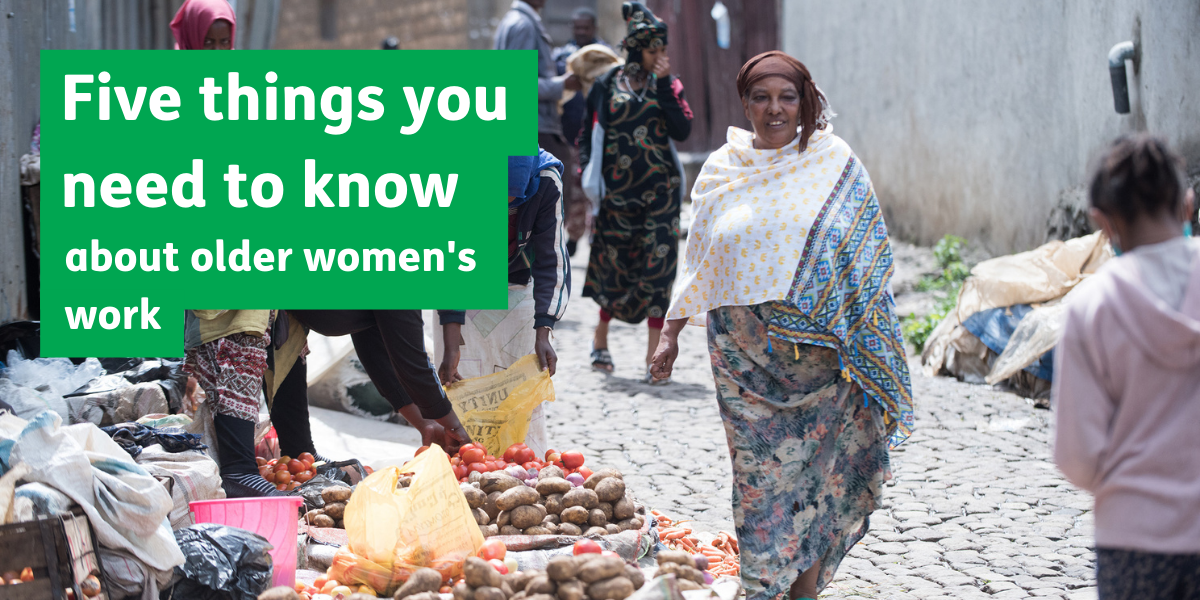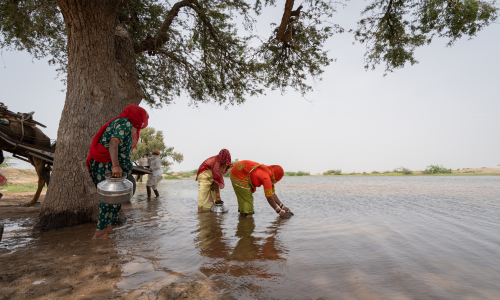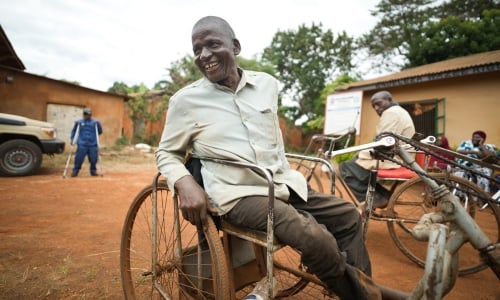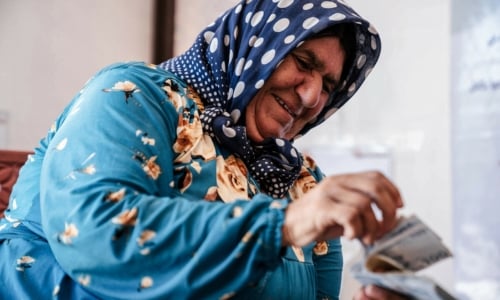

A new report, Older women: the hidden workforce, has been published today (1 October) describing how older women in many of the poorest countries are doing paid and unpaid vital work for their communities and their families, and yet their tireless contributions go unrecognised around the globe. We’ve listened to the voices of older women across the globe, including Ethiopia and Malawi for our research, and this is what they need you to know.
1. They’re doing relentless paid and unpaid work
We define work as being all the activities that another person could perform on your behalf, including all forms of informal and formal paid work: self-employment and work for others, as well as all types of unpaid work; unpaid care work for children, adults with care and support needs, and other community members; volunteering in the community; and domestic work including laundry, cooking, cleaning and collecting water and firewood for yourself, your family and your community.

Did you know?
In low and middle-income countries, around one in seven women ages 65+ are in work, and in Sub-Saharan Africa this number is even higher – four in ten older women. This compares to one in ten older women in high-income countries like the UK.
Globally, the youngest and the oldest are more likely to be carrying out informal, not formally regulated work than other age groups. Older people are more likely than younger people and women are more likely than men to be doing informal work, lacking access to a steady, secure wage. In addition to this, pre-COVID-19, older women globally were doing an average 4.3 hours per day unpaid care and domestic work – this is likely to have increased during the pandemic.
2. They have little choice or support
Across the globe, most women do unpaid work such as caring, domestic chores and more. However, the stark difference for older women in low and middle-income countries is that they are less likely to have a choice in doing this work, and support structures such as social welfare, free healthcare and pensions are near non-existent.

Did you know?
Only around 20 per cent of older people in low-income countries have access to a pension – and older women are less likely to have access to pensions than men. In comparison, in Europe 95 per cent of older people have access to a pension. And there is a ‘gender pension gap’ in all contexts globally. This leaves many older women in poorer countries with no choice but to carry out paid work on top of their unpaid duties.
But due to the double discrimination of ageism and sexism, the options available to women tend to be limited, with many working within informal, unregulated industries. The work available is physically taxing and becomes increasingly challenging in later life.
3. The hidden workforce is unrecognised but vital to societies and economies
Systemic gender inequalities, ageism and a lack of public awareness leave older women exposed to discrimination, exclusion, poverty and health inequalities. Despite economies being unable to function without it, the unpaid care work of all women is often not included in economic measures and policy planning and older people are often excluded from measures and analysis of paid work.
Unfortunately, older women’s contributions are often entirely overlooked, making their work appear even less valuable. Assumptions that older women are recipients of care obscure the diversity and complexity of older women’s lives, relegating them to the sidelines of efforts to achieve women’s economic empowerment and gender equality. Data gaps are often cited as the reason for older women’s exclusion from policy. Many census, administrative and household surveys overlook older people or directly discriminate against them by using age caps. Where data is collected, it is often for a single generic category of 50+, 60+, or 65+, yet think how different the lives and experiences of women in their fifties or sixties may be compared to those in their seventies and eighties.
“After I finish my work and get back to my home at 8 pm, I take shower and eat my dinner with my family and wash utensils. When they sleep I spin cotton for traditional dress and sometime when it is holyday I am doing basket. I am the one who decides on my income. I have worked hard to earn the money so nobody orders me what to do.”
4. Their rights are not being met or their voices heard
Older women are committed to their multiple roles – as street sellers, craft makers, pieceworkers, subsistence farmers, farmers, counsellors, brick breakers, caterers, cleaners, community volunteers, educators, and as grandmothers and carers. They often take pride in their work, both paid and unpaid, and value the economic independence an income allows them, whilst desiring better options or opportunities. They have clear aspirations for improving their lives and supporting others to improve theirs.
However, the support they receive to achieve this is falling far short. Older women want their voices to be heard and action to be taken. The barriers they face often leave them with little choice but to continue doing precarious, unrecognised informal work on top of their already significant unpaid care and community roles, without support from their communities or governments, which is putting their wellbeing, health and ultimately their lives at risk.
In short, older women across the globe, especially in the poorest countries, are being let down by their governments and society.
“We are living in very difficult situations. If the quality of life of older people is to be improved, changes are needed in access to livelihood opportunities, plus improvements in social protection systems as well as initiatives to strengthen family and community support systems.”
5. We can and must create change for older women worldwide
With fewer than 10 years left to achieve the Sustainable Development Goals and the 2030 Agenda, it is more urgent than ever to tackle gender equality and women’s economic empowerment through a ‘life course approach’ that explicitly includes older women, taking into account older women’s economic rights, their perspectives, their economic roles, and the contributions they make to society.
We want economic justice for older women in all their diversity. They must have access to the following rights:
- secure income
- choice over employment
- decent working conditions
- social protection
- affordable healthcare and long-term care for themselves and their families
- financial inclusion.
We’re calling on UK Government to specifically include older women in their new international strategy. You can take action by signing our petition and showing them that there is public support for doing more to help older people and to address the barriers older women face to their rights.
Across the globe older women, especially in the poorest countries, are facing systemic failures and being let down by their governments and society daily. But it doesn’t have to be this way. Sign our petition now and call on the UK Government to take older women into account.



